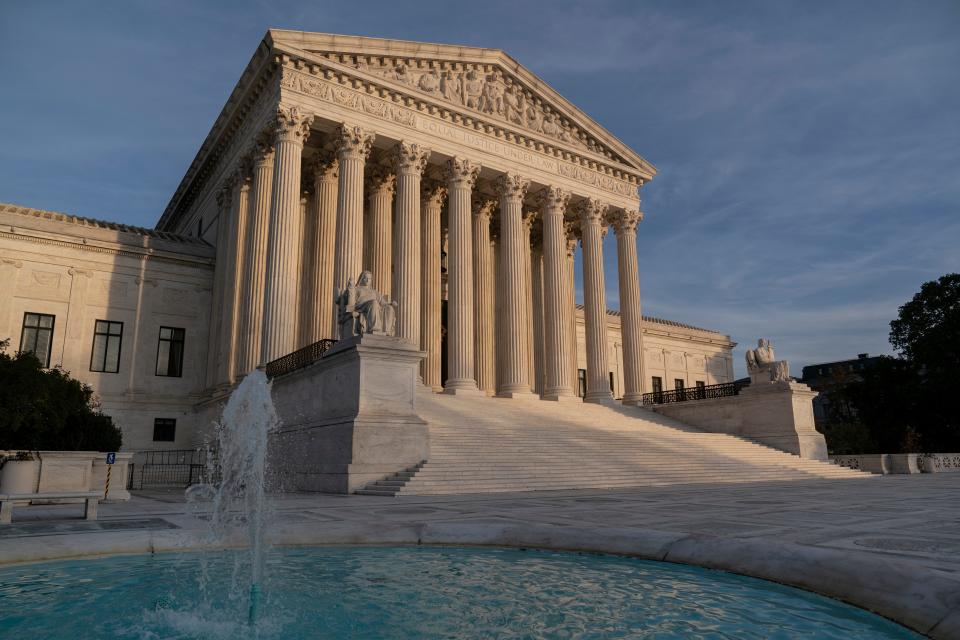Supreme Court to debate whether misdemeanors can be a foot in the door for warrantless home search
WASHINGTON – Arthur Lange was 100 feet from his driveway when the California Highway Patrol officer behind him flipped on his flashing lights. Rather than stop, Lange turned toward his Sonoma County home, pulled into his garage and closed the door.
What happened over the next few seconds prompted years of litigation and a case to be argued Wednesday at the Supreme Court with sweeping implications for police power.
As Lange's garage door descended on that night in October 2016, officer Aaron Weikert got out of his car and stuck his foot under it, triggering a sensor that sent it back up.
"Did you not see me behind you?" the officer asked Lange, who said he had not. As Lange spoke, Weikert smelled alcohol on his breath. A test revealed Lange's blood-alcohol content was three times the legal limit, and he was charged with DUI.
Term ahead: Supreme Court takes 'go-slow' approach on divisive issues
Report: Federal judge says assailant who attacked family had dossier on Sotomayor
The question at the heart of the exchange: whether Weikert was on constitutionally shaky ground when he entered Lange's garage without a warrant.
Police are generally required to have a warrant to enter someone's home under the Fourth Amendment's prohibition on "unreasonable searches." Courts have allowed exceptions when an officer is in "hot pursuit" of a suspect believed to have committed a felony. In Lange's case, police could point only to his failure to stop, a misdemeanor.
Though the difference may seem academic, civil liberty groups say the case could vastly expand police powers because of the breadth of misdemeanor charges. Misdemeanor crimes can be serious, but they also include littering, jaywalking and defacing dollar bills.
Courts have reached different answers to the question at issue in the case. Five state supreme courts have held a misdemeanor pursuit justifies a warrantless home entry, according to Lange's lawyers, and three state courts and two federal appeals courts said the issue must be reviewed on a case-by-case basis.
"The courts are all over the place on this," said Larry James, general counsel for the National Fraternal Order of Police, who filed a brief in the case supporting Weikert. "The question is, should the U.S. Supreme Court lay down the law of the land."

Fourth Amendment questions have divided the Supreme Court in unusual ways. Liberal Justice Stephen Breyer has joined conservatives, and when conservative Antonin Scalia was a member of the court, he sometimes sided with liberals. Last fall, Justice Neil Gorsuch called a ruling in Vermont allowing game wardens to peer inside a garage without a warrant an “error.” Gorsuch, appointed by President Donald Trump, was joined by Justices Sonia Sotomayor and Elena Kagan, both appointed by President Barack Obama.
More: Supreme Court rules police need warrant to search vehicle on private property
More: From heroin in a trunk to stolen motorcycle, Supreme Court defends privacy
Lange's case comes to the court at a moment of tension between police and communities of color after the death last year of George Floyd, a 46-year-old Black man who was pinned under an officer's knee. The officer, Derek Chauvin, is charged with second-degree murder and manslaughter. The incident, and others like it, prompted nationwide protests and some riots over the summer, forcing a national discussion about racism and police use of force.
One of those incidents was the shooting death of Breonna Taylor, 26, after police entered her apartment in Louisville, Kentucky, during a drug investigation last March. Police had obtained a "no-knock" warrant, allowing them to conduct a search without notification. The city subsequently banned no-knock warrants.
Some observers said expanding the circumstances under which a police officer may enter a home without a warrant could exacerbate the fraught relationship.
"It wouldn't open the door, it would open the floodgates to police entry into a home," said Alexandra Natapoff, a Harvard Law professor who has written widely on the proliferation of misdemeanor crimes. "It would seem to be exactly the backward response to everything we have learned from George Floyd and Black Lives Matter."
On the other hand, some advocates say allowing a suspect to dart into a home to avoid possible arrest creates another set of problems for police. Officers can't always immediately determine whether a suspected drunken driver may be committing a felony or a misdemeanor, for instance, a distinction that can turn on factors such as blood-alcohol level, prior convictions or whether a child is in the car.
"Time degrades evidence," said Alex Otte, president of Mothers Against Drunk Driving, which advocates for a categorical exception to the warrant requirement in cases where police are in pursuit of a misdemeanor suspect. "Even if it is a true misdemeanor, they should still be forced to face the consequences of their potential deadly choice."
The case came to the U.S. Supreme Court after the California Supreme Court declined to hear it, allowing a lower court's ruling that sided with police to stand.
Though the state appeals court ruling created the broad warrant exception for misdemeanor pursuit, California isn't defending that power for police in the high court. Attorneys for California argued that Weikert's actions represented a good faith effort to adhere to law.
Instead, the Supreme Court appointed attorney Amanda Rice to defend the misdemeanor exception.
"There is nothing reasonable about allowing an offender to defeat a lawful public arrest by fleeing into a home," Rice told the court. "That is true regardless of whether the underlying crime happens to be classified as a felony or a misdemeanor."
This article originally appeared on USA TODAY: Supreme Court to debate when police can conduct warrantless search

 money
money 